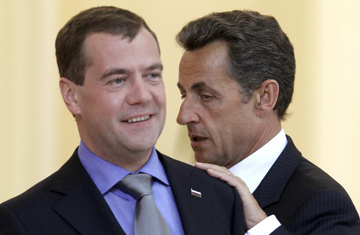
Russian President Dmitri Medvedev, left, and French President Nicolas Sarkozy attend a joint news conference in St. Petersburg
For the past two decades, Western nations have lunged between embracing Russia as a post-communist friend and confronting it as a recidivist foe. That alternation is now surging to the positive side. On Thursday, President Obama affectionately greeted his Russian opposite, Dmitri Medvedev, at the White House. Less than a week earlier, French leader Nicolas Sarkozy pitched similar love in Moscow's direction. And if there's any doubt that a spirit of cooperation now prevails, just ask one of the many Western CEOs lined up to do business with Russia, confident that the climate is right for partnership.
During a joint press conference in Washington, Obama told Medvedev that cooperation between the two countries must now go beyond achievements like a recent accord to reduce nuclear arsenals. Russo-American relations have been reset by such security agreements, Obama suggested, but it's time to progress to broader cooperation. "Twenty years after the end of the Cold War, the U.S.-Russian relationship has to be about more than just security and arms control," Obama told Medvedev and an attending press corps. "It has to be about our shared prosperity and what we can build together."
The gaggle of American and Russian CEOs hovering around Medvedev's visit provided proof that efforts to increase economic ties are already under way. Russia needs the foreign investment: recent reports suggest that the country requires about $1 trillion to restore its aging Soviet infrastructure, a figure the budget cannot hope to cover. But if Russia has been forced into realizing that it must be open for business, America is not the only one vying for an invite. Sarkozy got a jump on Obama on June 19, when he traveled to Russia for the final session of the St. Petersburg International Economic Forum. Accompanied by a small army of French business leaders, Sarkozy oversaw the signing of about 25 major contracts between Russian and French companies worth an estimated $6.1 billion.
"The Cold War is finished, the Wall is finished," Sarkozy said, urging Medvedev to deepen both economic and security ties with France as well as the entire European Union. "Russia is a great power. We are neighbors. We have the vocation to be friends, [and] we must become closer."
To some extent, a bit of Western jousting is at work in the French and American appeals for Moscow to become a closer, fuller partner in global affairs. Obama's promise in Washington to help Russia join the World Trade Organization was motivated in part by U.S. desires to do more Russian business, while simultaneously holding Moscow accountable to international rules. In urging Russia to assume a bigger role in the effort to establish new global regulation of financial markets and create a worldwide tax accord on banks, meanwhile, Sarkozy was looking toward the G-20 summit in Toronto, where those efforts will meet resistance from the U.S., U.K. and Canada.
Sarkozy's other objective is to close in on Germany's lead as Russia's biggest European bilateral trading partner by upping the $17 billion in goods that France and Russia exchanged in 2009 — the Russo-German volume was $53.8 billion. That effort — which Medvedev encourages — was bolstered by Franco-Russian contracts signed as part of Sarkozy's St. Petersburg visit by French food giant Danone, aerospace company Arianespace and trainmaker Alstom. Elsewhere, energy companies GDF-Suez and Electricité de France, respectively, bought large stakes in Russia's North Stream and South Stream gas pipelines — a move Paris hopes may weaken Moscow's habit of using energy exports as a diplomatic cudgel.
"France realizes that Russia is at times difficult — even troublesome — but remains a critical partner in terms of bilateral relations, energy policy, E.U. relations, as a member of the G-20 and as part of an extended Europe-Atlantic security alliance," says Thomas Gomart, director of the Russia Center at the French Institute on International Relations in Paris. And while Sarkozy's love offensive toward Moscow may look merely like France seeking to rival Germany as Russia's top economic and political partner in Europe, Gomart notes that the picture is less divisive than that.
"Paris definitely wants to become a bigger partner to Russia, but its [overtures to Russia are] also part of a converging view with Berlin, Rome and increasingly Poland that — like it or not — Russia will be the top issue the European Union will have to deal with over the next decade," Gomart says. "Rather than shun Russia for the problems it creates, the objective is to encourage Moscow to further integrate into European and international partnerships and structures. The idea is to create positive, productive, even profitable cooperation projects now in order to encourage Russia to avoid troublesome behavior in future."
Lastly, Gomart adds, Paris' courtship of Russia is partly a defensive move to address what France sees as "Germany's drift toward the East," as it has begun to have doubts about a future rooted solely in the E.U. In other words, don't expect these to be the last overtures from Sarkozy, Obama or other leaders. Whatever the motives that pave them, the road from many Western capitals these days leads to Moscow.
